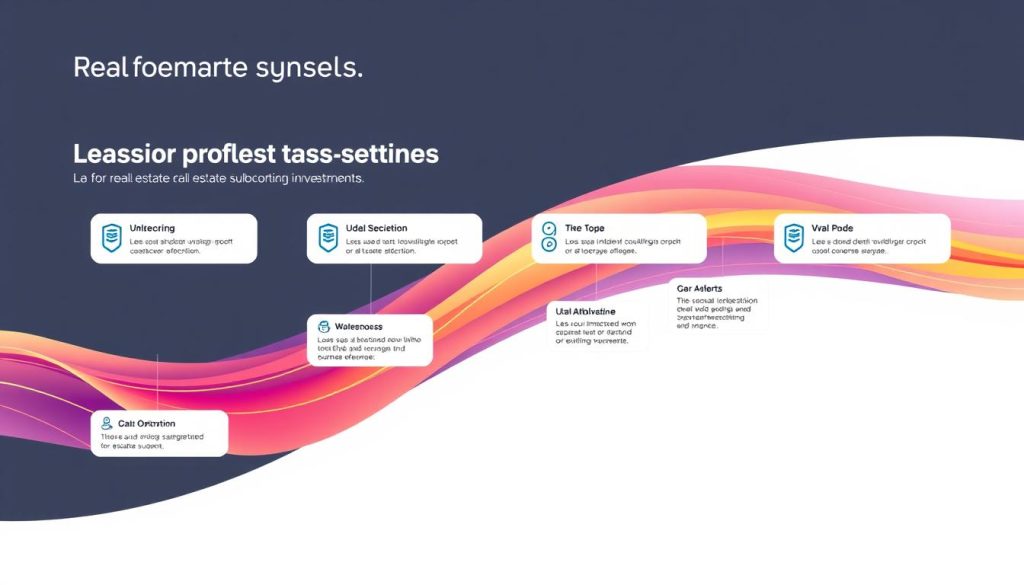Real estate syndication investment outreach has changed the game in alternative investments. Savvy investors now use cold email strategies to find partners and make deals. This method is similar to what works in hedge fund investor relations but is tailored for real estate.
By sending out compelling emails, syndicators can reach a lot of potential investors. This way, they can build a network of investors ready for real estate opportunities. The secret is knowing the market and making your message hit home with potential partners.
Key Takeaways
- Cold email strategies are essential for real estate syndication outreach
- Alternative investment partner emails can help secure lucrative deals
- Targeted outreach builds a network of qualified investors
- Understanding market trends is crucial for successful syndication
- Tailoring messages to potential partners increases engagement
Understanding Real Estate Syndication Investment Outreach
Real estate syndication investment outreach is key in private equity. It connects potential investors for big property deals. This lets people join in on deals they couldn’t do alone.
Defining Syndication Investment Models
Syndication models differ in structure and roles. You’ll find:
- Single-asset syndications
- Multi-property funds
- Blind pools
Each model has its own pros and cons. Knowing these helps in making marketing materials.
The Role of Cold Email in Capital Raising
Cold email is big in today’s capital raising. It lets syndicators reach many potential investors quickly. Good cold emails should:
- Highlight unique investment chances
- Show past success
- Give clear steps for those interested
Current Market Dynamics and Opportunities
The real estate market is always changing, offering new chances for syndication. Trends include:
| Trend | Impact on Syndication |
|---|---|
| Rise of remote work | More demand for suburban homes |
| Aging population | More interest in senior living |
| E-commerce growth | Chances in industrial real estate |
These trends shape how syndicators reach out to big investors. They guide what syndication focuses on.
“Real estate syndication is not just about properties; it’s about building relationships and creating value for investors.”
Understanding these points helps syndicators make strong outreach campaigns. These campaigns attract investors and help raise capital.
Building Your Investor Database for Targeted Outreach
Creating a strong investor database is crucial for real estate syndication success. It involves finding potential investors and tailoring your approach to their needs. A good database helps match investors with the right investment strategies.
Begin by sorting your database into groups based on investor preferences and risk levels. This lets you offer personalized strategies that meet each investor’s goals. Here are some investor types to consider:
- High-net-worth individuals seeking long-term growth
- Institutional investors focused on stable returns
- Family offices looking for diversified real estate portfolios
- Accredited investors interested in tax-advantaged opportunities
Keep detailed records of each investor’s past investments, communication history, and investment criteria. This info helps you create messages that speak to their interests and financial goals.
| Investor Type | Preferred Asset Allocation | Risk Management Focus |
|---|---|---|
| High-net-worth Individuals | 60% Core, 30% Value-Add, 10% Opportunistic | Capital preservation with growth potential |
| Institutional Investors | 80% Core, 15% Value-Add, 5% Opportunistic | Steady cash flow and low volatility |
| Family Offices | 50% Core, 35% Value-Add, 15% Opportunistic | Balanced approach with tax efficiency |
| Accredited Investors | 40% Core, 40% Value-Add, 20% Opportunistic | Higher risk tolerance for potential returns |
Keep your database up to date to ensure it remains accurate and relevant. Regular updates help you stay in touch with changing investor preferences and market trends. This makes your outreach efforts more effective in real estate syndication.
Crafting Compelling Investment Partner Emails
Effective emails are key for hedge fund and private equity success. They need skill and strategy to grab attention and engage readers.
Subject Line Optimization
Your subject line is your email’s first impression. It should be short, interesting, and on point. For example, “Exclusive Real Estate Opportunity: 15% Target ROI” catches the eye and hints at the value inside.
Value Proposition Development
Clearly state what makes your investment special. Talk about key metrics, market benefits, and your success history. A strong pitch might be: “Our fund has beaten the market by 7% over five years.”
Call-to-Action Best Practices
Direct your readers with a clear call-to-action (CTA). Use words that encourage action and create a sense of urgency. For example: “Book your investment meeting this week for early-bird rates.”
- Make CTAs visible and easy to act on
- Offer multiple ways to engage (phone, email, calendar link)
- Personalize CTAs based on investor profiles
Remember, success in private equity comes from building relationships. Your emails should open doors to deep talks about investment chances.
Developing Professional Fund Marketing Materials
Creating effective fund marketing materials is key to attracting institutional investors. These materials highlight your asset allocation strategies. They are powerful tools for real estate syndication outreach, presenting investment opportunities clearly and compellingly.
Investment Memorandum Creation
An investment memorandum is a crucial document for your real estate syndication offer. It outlines the investment details, market analysis, financial projections, and risk factors. Focus on clarity and transparency to build trust with potential investors.
Deal Flow Presentation Templates
Develop standardized templates for presenting deal flow to streamline your outreach. These templates should highlight key metrics, property details, and potential returns. Use visually appealing graphics and charts to make complex information easy to understand for investors.
Digital Asset Portfolio Design
A well-designed digital asset portfolio showcases your expertise in real estate syndication. Include high-quality images of properties, performance data, and testimonials from satisfied investors. Make sure your portfolio is easily accessible and optimized for various devices to enhance institutional investor outreach.
| Marketing Material | Key Components | Purpose |
|---|---|---|
| Investment Memorandum | Offer details, market analysis, financials | Provide comprehensive investment information |
| Deal Flow Templates | Key metrics, property details, returns | Present opportunities consistently and efficiently |
| Digital Asset Portfolio | Property images, performance data, testimonials | Showcase expertise and track record |
Institutional Investor Communication Strategies
Getting in touch with institutional investors is key for real estate syndication success. They want detailed info and solid risk management plans. You must tailor your approach to meet their specific needs.
Professional presentations are essential. Make detailed investment memorandums that show your success, market insights, and diversification plans. Use clear, data-rich visuals to prove your expertise.
Being open is a must. Share all about potential risks and how you plan to handle them. Institutional investors value honesty and thorough risk checks. This builds trust and shows you care about their interests.
- Provide regular, detailed performance reports
- Offer personalized portfolio reviews
- Host exclusive webinars on market trends
Institutional investors take their time to decide. Be patient and keep in touch. Be ready to answer questions and provide more info quickly. This can make you stand out in a crowded market.
“The key to successful institutional investor relations is consistency, transparency, and a deep understanding of their investment criteria.”
By using these strategies, you can build strong ties with institutional investors. This could lead to bigger investments and lasting partnerships in your real estate syndications.
Portfolio Diversification and Risk Management Messaging
When you talk to potential investors, it’s key to share how you diversify and manage risks. This builds trust and shows you know how to protect investments.
Risk Mitigation Strategies
Point out the main ways you reduce risks in your outreach. This could be spreading out investments, doing deep research, and managing leverage wisely. Explain how these steps keep investor money safe and boost returns.
Asset Allocation Frameworks
Share your asset allocation plans for real estate syndication clearly. Talk about the mix of different property types, locations, and time frames. This shows you’re serious about building strong portfolios.

Performance Metrics Presentation
Show off performance metrics to prove your diversification works. Include things like:
| Metric | Description | Importance |
|---|---|---|
| Cash-on-Cash Return | Annual cash flow relative to invested capital | Indicates ongoing income potential |
| Internal Rate of Return (IRR) | Time-weighted return measure | Reflects overall investment performance |
| Equity Multiple | Total returns relative to initial investment | Shows potential wealth creation |
By clearly sharing your risk management and diversification strategies, you make your syndication look like a great investment choice.
Legal Compliance in Syndication Outreach
Real estate syndication outreach needs strict legal rules. Syndicators must follow these rules to raise capital legally. This section looks at important legal aspects of syndication outreach.
SEC Regulations and Guidelines
The Securities and Exchange Commission (SEC) watches over syndication. Syndicators must know and follow SEC rules to raise capital. These rules protect investors and keep the market fair. They cover registration, disclosure, and reporting.
Disclosure Requirements
Being open is key in syndication outreach. Syndicators must share all the facts with potential investors. This includes the investment details, risks, and financial plans. Clear disclosure helps investors make smart choices and keeps syndicators out of trouble.
Documentation Best Practices
Good documentation is key for legal syndication. Subscription document templates are very important. They make sure all investor info is collected right. They also make the capital commitment process smoother and legal.
| Document Type | Purpose | Key Elements |
|---|---|---|
| Private Placement Memorandum | Detailed offering information | Investment terms, risks, financials |
| Subscription Agreement | Investor commitment | Investment amount, investor details |
| Operating Agreement | Entity governance | Management structure, profit distribution |
By sticking to these legal rules, syndicators can run successful and legal private equity campaigns. This builds trust with investors and helps in the long run.
Subscription Process Optimization
Improving the subscription process is key for real estate syndication investments. By making subscription documents and capital commitment processes better, syndicators can make the investor experience better and work more efficiently.

Good subscription document templates save time and cut down on mistakes. They should be easy to understand, to the point, and fit your specific offer. Include important details like investment terms, risks, and legal stuff. Using digital platforms can make filling out documents and getting signatures faster.
For better capital commitment processes, make the journey from interest to investment smooth. Create a clear guide for investors, showing each step of the process. This makes investors trust you more and helps manage their expectations.
When reaching out to institutional investors, you need a special plan. Make your subscription materials fit their unique needs and wants. Give them detailed due diligence packages and be ready to answer deep questions about your investment strategy and past success.
| Optimization Area | Key Strategies | Benefits |
|---|---|---|
| Subscription Documents | Digital templates, Clear language | Faster completion, Reduced errors |
| Capital Commitment | Step-by-step guide, Online portal | Improved transparency, Streamlined process |
| Institutional Outreach | Customized materials, Detailed due diligence | Higher credibility, Increased trust |
By focusing on these areas, syndicators can make the subscription process better and more friendly to investors. This leads to stronger relationships and successful fundraising.
Building Long-term Investor Relationships
In real estate syndication, building strong connections with investors is crucial. This is similar to how hedge funds value trust and clear communication. By focusing on these relationships, syndicators can get ongoing support for their future projects.
Follow-up Communication Protocols
Setting up clear follow-up plans is essential in raising private equity. Regular updates, personalized messages, and quick responses to questions build trust. This keeps investors interested and informed about their investments.
Investor Update Strategies
Good updates are key for reaching out to institutional investors. Quarterly reports, annual meetings, and timely updates on big news keep investors informed. These updates should be easy to understand, focusing on both the good and the tough parts of the investment journey.
Relationship Management Tools
Using modern tools can greatly improve investor relations in real estate syndication. CRM systems, secure portals, and data analytics platforms make communication easier and provide useful insights. These tools help syndicators meet each investor’s specific needs, making their relationships stronger and more lasting.






